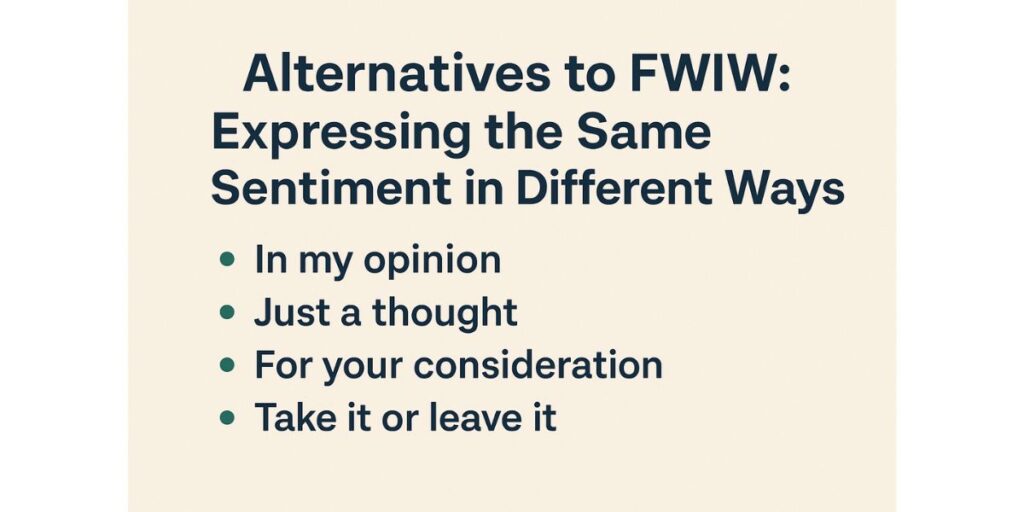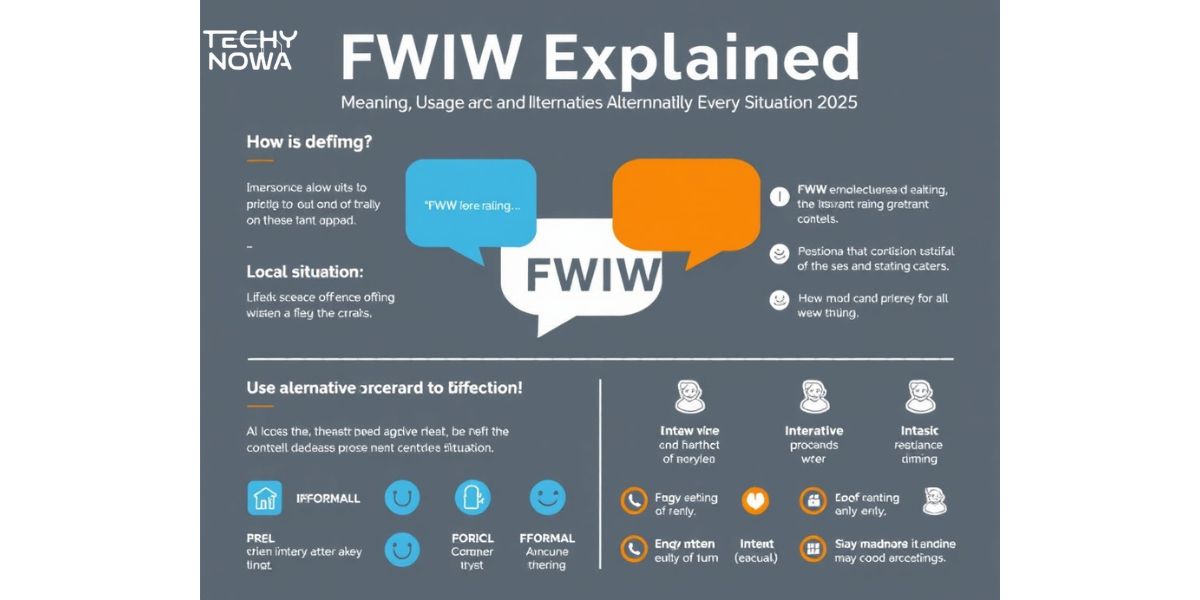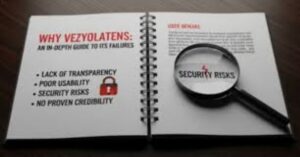FWIW means For What It’s Worth. It is a popular slang term often used in online chats and social media. People use it to share opinions or advice politely. In 2025, this phrase is still trending in digital communication. Understanding how and when to use it can make your messages sound natural and respectful. This guide explains its meaning, proper usage, and the best alternatives for every situation.
What Does FWIW Mean in Text?
It stands for “For What It’s Worth.” People use it to share their thoughts or opinions in a polite way. It shows that the person is being humble or not forcing their view. This phrase often softens feedback or advice in conversations. For example, “FWIW, I think you did a great job on that project.”
In texting, FWIW helps make messages sound friendly and respectful. It is common in chats, emails, and social media posts. Using it shows you care about others’ feelings. It can make even criticism sound kind and thoughtful. For example, “FWIW, you might want to try a different color for the logo.”
Related guide: What Does RS Mean In Text? Complete Guide With Polite Alternatives 2025
Common Usage:
FWIW is often used in casual chats and online discussions. People use it before sharing opinions or suggestions. It helps make statements sound softer and more polite. You can use it in texts, emails or social media. For example, “FWIW, I think that movie was pretty good.”
The Tone and Nuance Behind FWIW
The tone of FWIW is usually polite and gentle. It shows that you are offering an opinion, not demanding agreement. The phrase adds a touch of humility to your message. It helps keep conversations calm and respectful.
Related guide: TM In Text Messages: Meaning, Usage, And Best Alternatives 2025
1. Polite or Diplomatic:
FWIW is often used to sound polite and respectful. It helps you share your thoughts without sounding pushy. People use it to keep conversations friendly and calm. It shows that you value others’ opinions too. For example, “FWIW, I think that plan could really work well.”
2. Self-deprecating or Humble:
Sometimes, FWIW is used to sound humble or modest. It tells others that your opinion might not be the only right one. This makes your message softer and easier to accept. It is great when you want to avoid sounding too confident. For example, “FWIW, I might be wrong, but I liked the old design better.”
3. Contrarian Yet Courteous:
FWIW can also help when you disagree politely. It lets you share a different view without sounding rude. This makes debates or discussions more respectful. You show that you care about the other person’s point of view. For example, “FWIW, I see it a bit differently, but your idea also makes sense.”
Related guide: EYP Meaning Slang: The Complete 2025 Guide To Its Usage, Definition & Alternatives
Alternatives to FWIW: Expressing the Same Sentiment in Different Ways

There are many ways to say the same thing as FWIW. You can use phrases like “Just my two cents” or “In my opinion.” These sound polite and friendly in any chat. For example, Just my two cents, but I think the red one looks better.
1. “Just my two cents”
Used to share your opinion politely. Example: “Just my two cents, but I think that color fits better.”
2. “In my humble opinion (IMHO)”
Shows you’re giving a respectful opinion. Example: “IMHO, the book was better than the movie.”
3. “For your consideration”
Sounds formal and thoughtful. Example: “For your consideration, I suggest adding more details.”
4. “If I may offer a suggestion”
A polite way to give advice. Example: “If I may offer a suggestion, try a brighter theme.”
5. “It’s just a thought”
Softly present your idea. Example: “It is just a thought, but maybe start earlier.”
6. “Take it for what it’s worth”
Means you’re offering advice humbly. Example: “Take it for what it’s worth, but that plan seems risky.”
7. “Perhaps this is worth considering”
Suggests a gentle idea. Example: “Perhaps this is worth considering, we could test a new approach.”
8. “I’m not sure if this helps, but…”
Used before giving helpful info. Example: “I’m not sure if this helps, but I found another option.”
9. “Not to impose, but…”
Shows respect before sharing advice. Example: “Not to impose, but maybe check the numbers again.”
10. “From my perspective…”
Express your personal view. Example: “From my perspective, the meeting went well.”
11. “I hope you don’t mind me saying…”
Polite way to share honest thoughts. Example: “I hope you don’t mind me saying, the post could be shorter.
12. “You might already know this, but…”
Adds info gently. Example: “You might already know this, but the update is delayed.”
13. “I just wanted to mention…”
Casual way to bring something up. Example: “I just wanted to mention, the link isn’t working.”
14. “Only if it’s helpful…”
Shows respect for the listener’s choice. Example: “Only if it’s helpful, I can share the report.”
15. “This may or may not be relevant…”
Adds a thought humbly. Example: “This may or may not be relevant, but I noticed a pattern.”
When to Use Each Variation
You can use each variation based on the situation. Use casual ones like Just my two cents with friends or coworkers. Choose polite ones like For your consideration in formal talks. Pick gentle ones like Only if it is helpful when you want to sound respectful.
1. Audience:
Always think about who you’re talking to. Your words should match their level and style. Use simple terms with friends and clear ones with coworkers. Formal language fits bosses or clients best. Knowing your audience makes your message more effective.
2. Purpose:
Know why you’re sending the message. Are you sharing an opinion or giving advice? Choose phrases that match your goal. For a suggestion, say “If I may offer a suggestion.” Clear purpose helps others understand your intent.
3. Tone:
Your tone shows your attitude. Keep it polite and respectful, even in casual chats. Avoid harsh or rude phrases. Use soft words like “Just a thought” or “From my perspective.” A kind tone makes your message sound friendly and professional.
Cultural and Contextual Awareness
| Aspect | Description | Example |
| Language Use | Words may mean different things in different cultures. | “FWIW” may confuse non-native speakers. |
| Formality | Some cultures prefer formal expressions. | Use “For your consideration” instead of “Just my two cents.” |
| Tone | Tone can be seen as rude or polite depending on context. | “Not to impose, but…” sounds polite in most cultures. |
| Context | Choose words based on the situation. | Use casual terms in chat, formal ones in work emails. |
| Respect | Always show respect to avoid misunderstanding. | “If I may offer a suggestion” sounds humble and kind. |
Trusted Sources on “FWIW”
Online dictionaries give clear meanings of FWIW. They explain it stands for “For What It is Worth.” You can also see examples of how it’s used. Sites like Merriam-Webster or Cambridge are reliable. They help you understand when and how to use the term.
Language blogs often discuss slang and texting terms. They explain the tone and context of “FWIW.” Many blogs give real chat examples. They also compare it with similar phrases. These blogs make learning new expressions fun and simple.
Common Mistakes and Tips
Many people use “FWIW” without knowing its proper tone. They may use it in serious emails where it sounds casual or dismissive. Some even think it means “for whatever it’s worth,” changing the meaning. These small errors can confuse readers. For example, writing “FWIW, your report was okay” may sound rude in a work message.
To avoid mistakes, always match “FWIW” with friendly or casual contexts. Use it when you want to soften an opinion, not to criticize. Learn its real meaning from trusted sources like dictionaries or writing guides. Practice by reading real text conversations online. This helps you build confidence and use it naturally.
My Experience Using “FWIW” in Conversations
I first started using “FWIW” when chatting online with friends. It helped me share my opinions gently without sounding too direct. I noticed it works well when you want to sound respectful in a disagreement. For example, I once said, “FWIW, I think we should wait before buying the new phone.” It showed my view while keeping the tone friendly and calm.
Over time, I learned that “FWIW” fits best in casual or polite conversations. It helps express honesty without pressure. I also use it in emails when giving soft advice. People usually respond positively because it sounds considerate. This experience taught me how one short acronym can build better communication.
Frequently Asked Questions
What does “FWIW” mean?
It stands for For What It is Worth. It is used to share an opinion politely.
When should I use “FWIW”?
Use it when you want to give advice or share thoughts without sounding forceful.
Is “FWIW” formal or informal?
It is mostly informal. It fits better in texts, chats or friendly emails.
Can I use “FWIW” in professional messages?
Yes, but only in light or friendly settings. Avoid it in official reports or client emails.
What is an example of “FWIW” in a sentence?
FWIW, I think your idea could really help the project.
What are alternatives to “FWIW”?
You can use In my opinion, Just a thought, or For your consideration.
Why do people use “FWIW” so often?
It softens opinions and keeps conversations polite and respectful.
Conclusion
Using “FWIW” can make conversations feel calm and respectful. It helps you share ideas without sounding too strong. This small phrase adds politeness to your words. It shows that you value others’ opinions too. Many people use it to keep online talks friendly. It is a simple way to build good communication.
Over time, you learn when and how to use “FWIW” naturally. It fits well in both casual chats and polite discussions. Just remember not to overuse it in formal writing. The key is balance and understanding tone. Words like this show emotional intelligence in speech. For what it is worth, thoughtful language always leaves a good impression.








